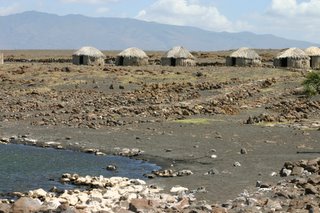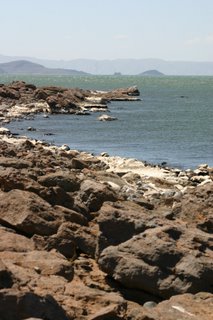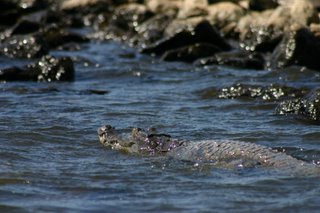Lake Turkana



We climbed back into the truck and pointed it in the direction of Lake Turkana, making a brief stop in some dusty town where the five us wandered down the street, half of the town’s raggedy children trailing behind us making half-hearted pleas for sweets. It felt awful to leave without leaving anything behind, like we were just a flash blowing through town offering regal waves and little else, but these towns had little to offer. We’d just had breakfast, so none of us wanted anything to eat or drink and other than a few tacky beaded necklaces that looked like they’d been strung together at Bible Camp, there was nothing to buy.
The roads got worse, if that’s possible, climbing higher and higher toward Turkana and Daniel had to switch on the four-wheel drive a few times. We came upon a work crew, being watched by a man with an assault rifle and they waved us down and asked for water, then went running in all directions to fetch dozens of bottles and cans. They seemed harsh and intimidating, yet smiled into the cab, asked us how we were doing in Swahili and waved us away when we’d filled up their water bottles. Mom’s initial guess that they were a prison crew turned out to be untrue, although it was an exceptionally good guess. They certainly looked like a ragtag band of criminals, and that would explain the presence of the man with the large gun. Daniel explained that it was an NGO that offered food in exchange for work and that their work was to rebuild these roads, but the only water sources was the lake, so they often went all day without food or water as they dug through rock and reshaped the road. (The lake was about 10 km at least away and I have no doubt that the road crews would drink all their water during the blistering walk to the job site.) The NGO turned out to be the World Food Program, the UN’s answer to hunger. This “food for” program is an interesting idea, but like the “food for oil” program, seriously flawed in practice. The working conditions were inhumane – I mean, we’re talking serious human rights violations; I wouldn’t want a prison crew working in those conditions – but Daniel said it at least kept the men occupied and away from their stills, which is how they used to dull hunger pains and make their living.
The lake came into view as we crested a rocky hill, a deep shade of green that gives the lake its nickname, the Jade Sea. We could see whitecaps and feel the push of the wind. The colours were muted: deep brown of the dirt and rock, small bits of thorny yellow trees, the deep green lake, the sliver of white caps, the faint outlines of hills and mountains in the distance.
We drove though a town of straw huts, each looking like it could roll away in the breeze and drove on and on toward our camp. We stopped to pick up the boat captain who would be taking us out onto the lake and drove and drove and drove and we all marveled at the thought that this man would have WALKED to camp. It was miles!
Turkana is a lot like its people: beautiful to look at but harsh and cruel up close. Desert -like temperatures rocketed to 50 degrees or more, and the lake sparkled, mocking our discomfort since its infested with crocodiles and only the foolhardy swim in it. (Two of our guides went for a quick dip – and I do mean quick – hurling rocks around them the whole time.) The showers were blistering hot and salty. The wind could literally drive one crazy with its non-stop screaming and pushing. The place was full of sharp objects and jagged edges, even the grass seemed to be made of knife blades, sticking like quills on tender feet.
After a quick lunch and a peek around camp – Mom and Dad walked around until they started to be followed by a woman – we climbed into the boat and headed out for a rather wet ride on the waves to watch the sun set. The night was a restless one, as the wind was relentless and none of us slept well over the sound of it. I got up in the night to use the bathroom, took a few steps and realized I wasn’t alone. There were a dozen donkeys staring back at me. The sky was stuffed with stars, the moon having yet to rise. It was incredible.
In the morning, we trudged back over to the boat and were intermittently soaked as we made our way to the south island, where we were hoping to spot some crocs. We were rather quiet on the way there and back, probably exhausted from too much time on the road and in desperate need of a comfortable bed, a temperature-controlled shower and a toilet that flushed. We stayed a second day and sought refuge from the heat at a pool in town that’s fed by a hot spring. On our way back, we picked up two little Turkana kids who belonged to one of the guys working at our camp. They climbed in through the window to the back seat and I slipped them each a granola bar. As we made stops around town, more children gathered and soon the Turkana kids were being treated like Muzugus, being stared at and having kids beg them for a bite or a sweet. A couple kids reached in to take the granola bars and eventually the little boy relented and tossed out what he hadn’t finished. To the rest he simply stuck out his tongue. Emily saw this and parroted him and before long it was a game, complete with song. Along the way to the camp, the little girl realized that low humming combined with bumpy road produces and interesting song. Soon we were all doing it. By the time we got to where the kids were supposed to get out, they refused. We’re just too much fun. Overall, it was a pretty relaxing day.
By this time our meals were getting a little interesting. We were eating vegetarian, as there’s no meat worth eating that lasts longer than four days without refrigeration, and breakfast was heavy on toast, as the loaves would dry out almost as soon as they were opened. And we were running out of fresh fruit.
The journey back was quick. We stopped overnight at Maralal, home of the world famous camel derby. The temperature plummet at night, to the point that I could feel it in my frozen little bones, despite being wrapped in a Masai blanket, Dad’s fleece, two shirts, PJs, my wrap and mom’s socks. We were all desperate for showers, pizza and comfy beds, but first we had to survive the AutoBahn that is the highway into Nairobi. The journey was hair-raising, as we skirted donkey carts and roadside markets and watched as crazy Kenya drivers pulled out to pass into oncoming traffic and seemed to play chicken with each as they drove around hairpin turns while climbing up from the Rift Valley.
Travel
The cruel paradise of Lake Turkana; Area scorched by searing heat, wind Receding water infested with crocs
Karen Palmer
Special to the star
852 words
13 April 2006
The Toronto Star
H02
Loyangalani, KENYA -- Standing on the shores of Kenya's brilliant green Lake Turkana watching its white caps crest, is like finding yourself a nickel short of an ice cream cone.
Temperatures at the world's only permanent desert lake can soar to an astonishing 50C, but the deep turquoise waters hold false promise of relief.
They are infested with crocodiles.
The relentless breeze carries warm air and no escape from the African sun's rays. Any hopes that it will bring cool reprieve at night are outweighed by the whine of the wind. Its ferocity means a constant howl blows through our round, palm-frond sleeping huts known as bandas.
The sunsets are spectacular and best viewed from the water. But the waves are so strong they wash the boat - and its passengers - in a near constant spray, making the entire enterprise a wet and rocky one.
Even the grass bites here, shooting sharp blades into tender toes just like a surly porcupine under attack.
Call it a cruel paradise.
But the night skies are stunning. A late-rising moon means the abundance of twinkling stars have no light competition. They seem to multiply the longer you look up.
Lake Turkana's harsh but breathtaking landscape is a geographical anomaly and difficult to reach. It's unlike anywhere else on Earth.
Once a freshwater lake that stretched from modern-day southern Ethiopia into northern Kenya that was fed by the White Nile, it was gradually separated from the great river by tectonic shifts and volcanic eruptions.
Those volcanic blasts produced the tableaux of rocky black sand that surround the lake region, including the Chabli Desert you have to pass to reach the lake.
The desert is an array of blacks, whites and ochres, produced by lava rock and silty salt and iron deposits. Across its great expanse, shimmering waves of heat make camel trains look like a mirage.
Its unusual beauty provided the backdrop for murder and suicide in last summer's The Constant Gardener, starring Ralph Fiennes and Rachel Weiss.
But it may not remain for long thanks to intense evaporation that is shrinking it. In fact, villages that were once on the water's edge now find themselves several kilometres away as the water recedes.
Isolated locals seem to have been toughened by years living with the wind, barren lands, hunger and poverty. We round a bend in the rocky road leading to Lake Turkana and see a group of men working under the watchful eye of a foreman with an assault rifle as part of a World Food Program "food for work" scheme.
Fish pulled from the lake are not part of the traditional milk and meat diet and there are concerns about whether they are healthy to eat. The surrounding land has never been able to support more than the occasional twiggy bush or thorny trees. Goats, camels and donkeys hide in rocky ledges, but food aid has been delivered to the area virtually since the time Kenya received its independence in the 1960s.
We slow down and the wizened, stone-faced men approach the truck with a fierceness almost as black as the landscape.
Turns out they are exhausted from rebuilding this road under the blazing sun and just want to refill their empty canteens, jerry cans and bottles.
After an afternoon spent searching in vain for relief from the heat, we settle on a swimming pool fed, ironically, by a hot spring. We bring along two children whose father lives and works at the Gametracker camp where we're staying.
As we bounce over the rocky road, a low hum comes from the backseat of our modified Land Rover. The little girl, who's about nine and speaks no English, has discovered that a bumpy road, combined with a low noise from a loose throat, produces a strange melody. Soon we're all doing it, much to the delight of the children, who are dressed in traditional red cloths and adorned with hundreds of loops of beads and dozens of aluminum earrings.
When we stop to let the children off near their hut, they refuse to get out of the truck. They're having too much fun.
Turns out they're just as curious about us as we are about them.
Karen Palmer is a former Star reporter now living in Africa.
| karen palmer photo Crocodiles prowl the waters of Lake Turkana, the world's only permanent desert lake, although that may not last as the area's intense heat often reaching 50C is causing relentless evaporation. karen palmer photo Bandas (huts) sit near the shore of Lake Turkana. The landscape is harsh, but also beautifully resplendent with colours from the lava rock, silty salt and iron deposits. - karen palmer photo Bandas (huts) sit near the shore of Lake Turkana. The landscape is harsh, but also beautifully resplendent with colours from the lava rock, silty salt and iron deposits.

0 Comments:
Post a Comment
<< Home